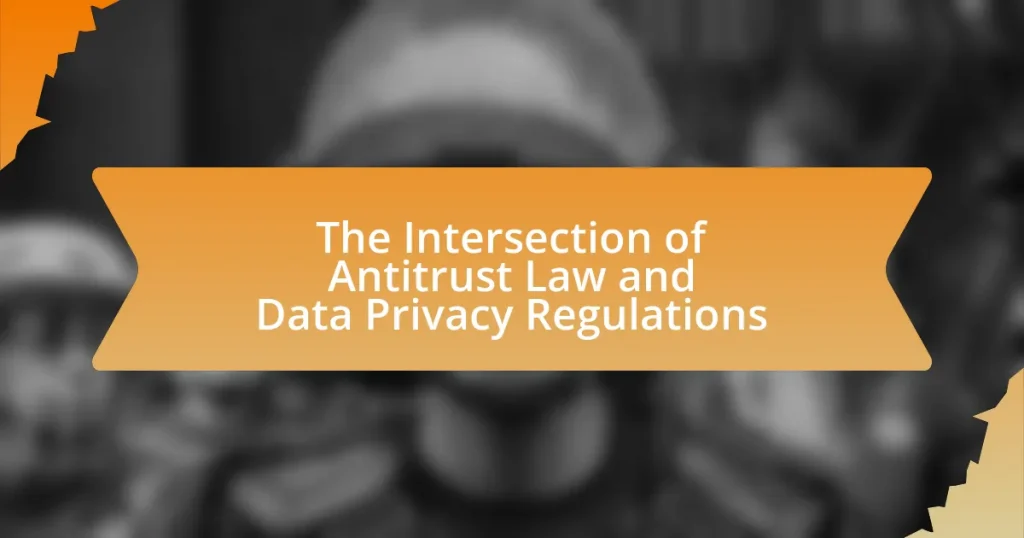The article focuses on the legislative process behind antitrust law reforms in the United States, detailing the steps involved from the proposal of legislation to presidential approval. It outlines the roles of key stakeholders, including lawmakers, government agencies, businesses, and consumer advocacy groups, in shaping antitrust regulations. The article also examines the necessity of reforms in response to market concentration and monopolistic practices, the influence of public sentiment and lobbying on legislative outcomes, and the challenges faced during the reform process. Additionally, it highlights best practices for enhancing transparency and stakeholder engagement in the legislative process.

What is the Legislative Process Behind Antitrust Law Reforms?
The legislative process behind antitrust law reforms involves several key steps, primarily initiated by Congress. First, lawmakers draft proposed legislation, often influenced by public concerns about monopolistic practices and market competition. This draft is then introduced in either the House of Representatives or the Senate, where it is assigned to a relevant committee for review.
During committee hearings, stakeholders, including industry experts and advocacy groups, provide testimony, which informs the committee’s decision to amend, approve, or reject the bill. If approved, the bill moves to the floor for debate and voting. A majority vote in one chamber sends the bill to the other chamber for consideration, where a similar process occurs.
If both chambers pass the bill, it is sent to the President for approval or veto. Successful reforms often arise from bipartisan support, reflecting a consensus on the need for regulatory changes to enhance competition and consumer protection. Historical examples include the Sherman Act of 1890 and the Clayton Act of 1914, which were responses to growing monopolistic practices in the U.S. economy.
How does the legislative process influence antitrust law reforms?
The legislative process significantly influences antitrust law reforms by determining the framework and scope of regulations that govern market competition. Through the introduction of bills, committee reviews, and debates, lawmakers shape the legal landscape of antitrust enforcement, often responding to economic conditions, public sentiment, and lobbying efforts. For instance, the introduction of the Antitrust Modernization Commission in 2005 aimed to evaluate and recommend changes to antitrust laws, reflecting the legislative body’s responsiveness to evolving market dynamics and concerns over monopolistic practices. This process ensures that antitrust laws remain relevant and effective in promoting fair competition and protecting consumers.
What are the key stages in the legislative process for antitrust laws?
The key stages in the legislative process for antitrust laws include proposal, committee review, floor debate, voting, and presidential approval. Initially, a bill is proposed, often by a member of Congress, which outlines the intended changes to antitrust regulations. This bill is then assigned to a relevant committee, such as the Judiciary Committee, where it undergoes detailed examination and possible amendments. Following committee approval, the bill is brought to the floor of either the House of Representatives or the Senate for debate, allowing members to discuss its merits and suggest further changes. After debate, a vote is conducted; if the bill passes, it moves to the other chamber for a similar process. Finally, if both chambers approve the bill, it is sent to the President for signature or veto. This structured process ensures thorough scrutiny and consideration of antitrust legislation before it becomes law.
Who are the main stakeholders involved in this process?
The main stakeholders involved in the legislative process behind antitrust law reforms include government agencies, lawmakers, businesses, consumer advocacy groups, and legal experts. Government agencies, such as the Federal Trade Commission and the Department of Justice, play a crucial role in enforcing antitrust laws and shaping policy. Lawmakers are responsible for drafting and voting on legislation that impacts antitrust regulations. Businesses, particularly those in competitive industries, are directly affected by these laws and often lobby for or against reforms. Consumer advocacy groups represent the interests of the public, pushing for stronger protections against monopolistic practices. Legal experts provide insights and analysis on the implications of proposed reforms, influencing the legislative discourse.
Why are antitrust law reforms necessary?
Antitrust law reforms are necessary to address the increasing concentration of market power among a few dominant firms, which can stifle competition and harm consumers. The rise of technology giants has led to monopolistic practices that limit innovation, raise prices, and reduce choices for consumers. For instance, a report by the House Judiciary Committee in 2020 highlighted that four major tech companies controlled significant market shares in their respective sectors, indicating a need for updated regulations to promote fair competition and protect consumer interests.
What economic factors drive the need for antitrust law reforms?
Economic factors driving the need for antitrust law reforms include market concentration, monopolistic practices, and the impact of digital platforms on competition. Market concentration has increased significantly, with a few large firms dominating various sectors, leading to reduced competition and higher prices for consumers. For instance, in the technology sector, companies like Google and Amazon control substantial market shares, which raises concerns about their ability to stifle competition and innovation. Additionally, monopolistic practices, such as predatory pricing and exclusive contracts, can harm smaller competitors and limit consumer choices. The rise of digital platforms has further complicated the competitive landscape, necessitating reforms to address issues like data privacy and anti-competitive behavior. These economic realities underscore the urgency for updated antitrust laws to ensure fair competition and protect consumer interests.
How do consumer interests shape antitrust law reforms?
Consumer interests significantly shape antitrust law reforms by influencing legislative priorities and regulatory frameworks. Lawmakers often respond to consumer demands for fair competition, lower prices, and improved product quality, which can lead to reforms aimed at preventing monopolistic practices. For instance, the 2010 Dodd-Frank Act included provisions to enhance consumer protection in financial markets, reflecting public concern over predatory lending and market manipulation. Additionally, consumer advocacy groups frequently lobby for stronger antitrust enforcement, highlighting cases where corporate consolidation harms consumer welfare. This direct engagement between consumers and policymakers ensures that antitrust laws evolve to address contemporary market challenges and protect consumer rights effectively.

What are the key components of the legislative process for antitrust law reforms?
The key components of the legislative process for antitrust law reforms include proposal, committee review, floor debate, voting, and presidential approval. Initially, a reform proposal is introduced in either the House of Representatives or the Senate. Subsequently, the proposal is assigned to a relevant committee, which conducts hearings and may amend the bill before voting on its advancement. If the committee approves the bill, it moves to the floor for debate among all members, where further amendments can be made. Following the debate, a vote is taken; if passed, the bill is sent to the other chamber for consideration. Finally, if both chambers approve the bill, it is sent to the President for signature or veto. This process ensures thorough examination and discussion of antitrust reforms, reflecting the complexities of market competition and consumer protection.
What role do committees play in shaping antitrust legislation?
Committees play a crucial role in shaping antitrust legislation by conducting hearings, gathering expert testimony, and drafting bills. These committees, such as the Senate Judiciary Committee and the House Judiciary Committee, are responsible for reviewing proposed antitrust laws, assessing their implications, and making recommendations for amendments. For instance, the Antitrust Subcommittee within these committees often holds hearings to evaluate market competition and the impact of monopolistic practices, which directly influences legislative outcomes. This process ensures that diverse perspectives are considered, leading to more informed and effective antitrust policies.
How do committee hearings influence public opinion on antitrust issues?
Committee hearings significantly influence public opinion on antitrust issues by providing a platform for discussion, expert testimony, and media coverage that shapes perceptions. During these hearings, lawmakers gather insights from industry experts, consumer advocates, and affected businesses, which helps to clarify complex antitrust matters for the public. For example, the 2020 House Judiciary Committee hearings on Big Tech highlighted concerns about monopolistic practices, leading to increased public awareness and debate about the need for regulatory reforms. This exposure can mobilize public sentiment, prompting citizens to advocate for changes in antitrust laws, as seen in the growing calls for stricter regulations on major tech companies.
What is the significance of committee reports in the legislative process?
Committee reports are significant in the legislative process as they provide detailed analysis and recommendations on proposed legislation, guiding lawmakers in their decision-making. These reports summarize the findings of committee hearings, present evidence, and outline the implications of the legislation, thereby facilitating informed debate and consideration among legislators. For instance, in the context of antitrust law reforms, committee reports can highlight the economic impacts of proposed changes, drawing on expert testimonies and data to support their conclusions. This structured approach ensures that legislators have access to comprehensive information, which is crucial for crafting effective and equitable laws.
How does lobbying affect antitrust law reforms?
Lobbying significantly influences antitrust law reforms by shaping legislative priorities and outcomes. Interest groups, including corporations and trade associations, engage in lobbying to advocate for specific regulatory changes that align with their business interests. For instance, the American Antitrust Institute has documented how lobbying efforts can lead to weakened enforcement of antitrust laws, as seen in the 2018 repeal of the Federal Trade Commission’s guidelines on vertical mergers, which were influenced by lobbying from large corporations seeking to consolidate market power. This demonstrates that lobbying can result in reforms that favor certain industries at the expense of competitive market practices.
What are the common tactics used by lobbyists in this context?
Common tactics used by lobbyists in the context of antitrust law reforms include direct lobbying, grassroots mobilization, and coalition building. Direct lobbying involves meeting with legislators and their staff to advocate for specific policy changes, often supported by detailed research and data to influence decision-making. Grassroots mobilization engages the public to contact their representatives, creating a sense of urgency and demonstrating widespread support or opposition to proposed reforms. Coalition building brings together various stakeholders, such as businesses, trade associations, and advocacy groups, to present a united front, amplifying their influence on lawmakers. These tactics are effective as they leverage personal relationships, public opinion, and collective power to shape legislative outcomes.
How can lobbying efforts impact the outcome of antitrust legislation?
Lobbying efforts can significantly influence the outcome of antitrust legislation by shaping policymakers’ perceptions and priorities. For instance, corporations and industry groups often engage in lobbying to advocate for or against specific provisions in antitrust laws, which can lead to legislative changes that favor their interests. A notable example is the lobbying by technology companies during the discussions surrounding the American Innovation and Choice Online Act, where extensive lobbying efforts aimed to dilute provisions perceived as harmful to their business models. According to the Center for Responsive Politics, in 2021 alone, the technology sector spent over $20 billion on lobbying, demonstrating the financial resources dedicated to influencing legislative outcomes. This financial clout allows lobbyists to provide research, expert testimony, and political contributions, which can sway legislators’ decisions and ultimately alter the trajectory of antitrust reforms.

What are the challenges faced during the legislative process of antitrust law reforms?
The challenges faced during the legislative process of antitrust law reforms include political opposition, lobbying from powerful corporations, and the complexity of economic theories. Political opposition often arises from differing ideological beliefs about market regulation, which can stall or derail proposed reforms. Lobbying from corporations, particularly those that may be negatively impacted by stricter antitrust laws, can significantly influence lawmakers through campaign contributions and advocacy efforts. Additionally, the complexity of economic theories related to competition and market dynamics can make it difficult for legislators to craft effective and clear policies, leading to confusion and potential loopholes in the legislation. These factors collectively hinder the timely and effective reform of antitrust laws.
What political obstacles hinder antitrust law reforms?
Political obstacles that hinder antitrust law reforms include lobbying by powerful corporations, partisan divisions in Congress, and the influence of political donations on lawmakers. Corporations often invest heavily in lobbying efforts to protect their interests, which can lead to resistance against reforms that would increase competition. Partisan divisions create challenges in reaching a consensus on proposed reforms, as differing political ideologies can result in conflicting priorities. Additionally, political donations from large companies can sway lawmakers’ positions, making them less likely to support reforms that could negatively impact their donors. These factors collectively create a complex environment that impedes the advancement of antitrust law reforms.
How do partisan divides affect the passage of antitrust legislation?
Partisan divides significantly hinder the passage of antitrust legislation by creating opposing viewpoints on market regulation and corporate power. For instance, Democrats typically advocate for stricter regulations to curb monopolistic practices, while Republicans often prioritize free-market principles and may resist extensive government intervention. This ideological clash can lead to legislative gridlock, as seen in the stalled efforts to advance comprehensive antitrust reforms in Congress during recent sessions. The lack of bipartisan support often results in diluted proposals or complete abandonment of initiatives aimed at addressing anti-competitive behavior, illustrating how partisan divides directly impact the effectiveness and timeliness of antitrust law reforms.
What role does public sentiment play in overcoming these obstacles?
Public sentiment plays a crucial role in overcoming obstacles to antitrust law reforms by influencing policymakers and shaping legislative agendas. When the public expresses strong support for reform, it can create pressure on legislators to act, as seen in various historical instances where grassroots movements have led to significant changes in antitrust policies. For example, the public outcry against monopolistic practices in the late 19th century contributed to the enactment of the Sherman Antitrust Act in 1890. This demonstrates that when citizens mobilize and articulate their concerns, it can lead to increased political will and urgency to address antitrust issues, ultimately facilitating the passage of necessary reforms.
How can the legislative process be improved for antitrust law reforms?
The legislative process for antitrust law reforms can be improved by enhancing bipartisan collaboration and increasing transparency in the drafting of legislation. Bipartisan collaboration can lead to more comprehensive and balanced reforms, as evidenced by the bipartisan support seen in the passage of the Hart-Scott-Rodino Antitrust Improvements Act of 1976, which established a framework for antitrust enforcement. Increasing transparency allows stakeholders, including businesses and consumers, to provide input and understand the implications of proposed changes, which can lead to more effective and widely accepted laws. For instance, public hearings and stakeholder consultations have been shown to improve the quality of legislation by incorporating diverse perspectives.
What best practices can enhance transparency in the legislative process?
Best practices that can enhance transparency in the legislative process include public access to legislative documents, regular updates on bill progress, and opportunities for public input. Public access to legislative documents, such as bills and amendments, allows citizens to understand the content and implications of proposed laws. Regular updates on bill progress, including committee hearings and voting schedules, keep the public informed about legislative activities. Opportunities for public input, such as hearings and comment periods, enable citizens to voice their opinions and influence decision-making. These practices are supported by initiatives like the Open Government Partnership, which promotes transparency and accountability in governance.
How can stakeholder engagement be increased in antitrust law reforms?
Stakeholder engagement in antitrust law reforms can be increased by implementing structured consultation processes that actively involve diverse groups, including businesses, consumers, and advocacy organizations. These processes can include public hearings, surveys, and collaborative workshops that allow stakeholders to voice their concerns and suggestions. For instance, the Federal Trade Commission (FTC) has utilized public workshops to gather input on proposed regulations, demonstrating the effectiveness of direct engagement. Additionally, transparency in the legislative process, such as sharing draft proposals and soliciting feedback, fosters trust and encourages participation from various stakeholders. This approach not only enhances the quality of the reforms but also ensures that the perspectives of all affected parties are considered, leading to more balanced and effective antitrust policies.
What practical steps can citizens take to influence antitrust law reforms?
Citizens can influence antitrust law reforms by actively engaging in advocacy efforts, such as contacting their elected representatives to express support for specific reforms. This direct communication can lead to increased awareness among lawmakers about public sentiment regarding antitrust issues. Additionally, citizens can participate in public comment periods during regulatory reviews, allowing them to voice their opinions on proposed changes. Joining or supporting advocacy groups focused on antitrust reform can amplify individual voices, as these organizations often have established channels for lobbying and public outreach. Research indicates that grassroots movements can significantly impact legislative agendas, as seen in the successful campaigns for stronger antitrust enforcement in various jurisdictions.
How can individuals effectively communicate with their representatives?
Individuals can effectively communicate with their representatives by utilizing direct methods such as phone calls, emails, and in-person meetings. These methods allow constituents to express their concerns, share opinions, and advocate for specific issues, such as antitrust law reforms. Research indicates that personal contact with representatives significantly increases the likelihood of policy influence, as noted in a study by the Congressional Management Foundation, which found that 70% of congressional staffers reported that constituent communications impact legislative decisions.
What resources are available for citizens to stay informed about antitrust issues?
Citizens can stay informed about antitrust issues through various resources, including government websites, nonprofit organizations, academic publications, and news outlets. The Federal Trade Commission (FTC) and the Department of Justice (DOJ) provide official updates, guidelines, and reports on antitrust laws and enforcement actions. Nonprofit organizations like the American Antitrust Institute offer analysis and commentary on antitrust policy. Academic journals publish research on antitrust issues, while reputable news outlets cover significant developments and cases related to antitrust law. These resources collectively ensure that citizens have access to accurate and timely information regarding antitrust matters.



